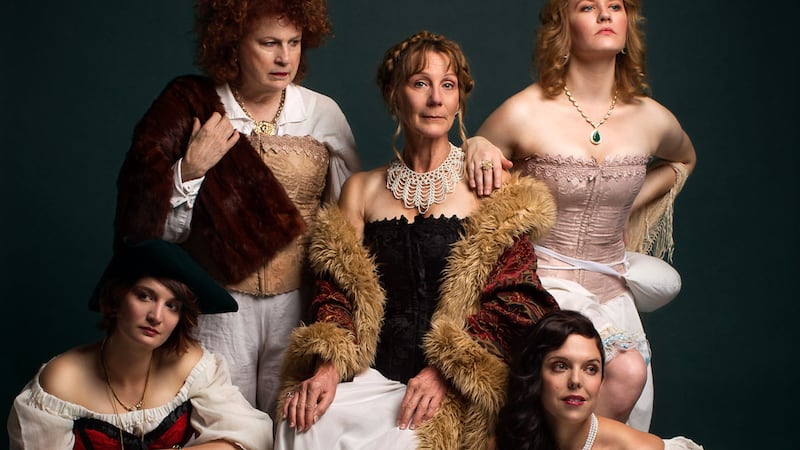Before the late 17th-century, all women in English theater were boys: It wasn’t until Charles II took power in the 1660s that it became legal for women to be actors. Playhouse Creatures, which is set just after that ban was lifted, explores the backstage lives and onstage performances of five actresses as they flex their freedom to be there.
But something ugly is lurking behind the curtain of the stage within a stage. Even when they’re not performing, the women must always be on: We watch the intimate process of preparing their outfits as they adjust their wigs and tie their corsets, always preparing for the next play. The period costumes are elaborate and stunning, and there’s multiple costume changes between the shows performed within the show. The cast speaks in an English accents, and the dialogue references Restoration period speech more than replicates it—though there’s some Old World phrasing, it’s not like deciphering Shakespeare.
Mrs. Farley (McKenna Twedt) is being courted by the king. Mrs. Marshall (Brenan Dwyer) is being harassed by a man who deceptively asked for her hand in marriage, before fleeing after consummation. And Mrs. Betterton (Lorraine Bahr), the eldest and most devoted to the craft, senses the crowd is there for the younger ones, not her. The safety of the theater collapses upon itself, as we’re given glimpses of outside male control, despite never seeing the men.
Each character demonstrates her own unique approach to dealing with the challenges of womanhood in their time period. In their coping mechanisms, we see the roots of feminism and the age-old persistence of women, constrained as it may be in their ever-tightening corsets.
Nell Gwynn (Dainichia Noreault) is new to the theater and not yet aware of the games she must play to succeed. Noreault delightfully portrays Gwynn’s refusal to constrain her sexuality, with slightly slapstick, comedic flare. When Gwynn finagles her way into a part without an audition, she flubs her lines and humiliates another actress onstage—but quickly makes up for it by going off script with extra skin and dancing.
The moment is at once empowering, and a disheartening glimpse of the perceived value of actresses. Female roles are finally theirs, but their bodies are not.
The entire cast strikes an effective, emotionally charged balance between pride and self-loathing—the joys of the stage inspiring the former, and the hecklers and opportunistic men tugging them back toward the latter. Their stories are delivered with a duality of strength and helplessness that is frustratingly relevant today.
The distant time period makes it extra frustrating that woman face so many of the same inequalities centuries later. In the most acute, albeit unplanned, parallel to the modern, we hear of a man who comes backstage to watch the women change—just like our former beauty-pageant-producing, backstage-ogling president.
As Doll Common (Jacklyn Maddux) puts it, “While bears love to dance, they hate to do it for the whip.” Centuries have passed, but women can still sense that same whip of misogyny.
SEE IT: Playhouse Creatures is at CoHo Theater, 2257 NW Raleigh St., cohoproductions.org. 7:30 pm Thursday-Saturday, 2 pm Sunday, through April 8. $20-$28.
